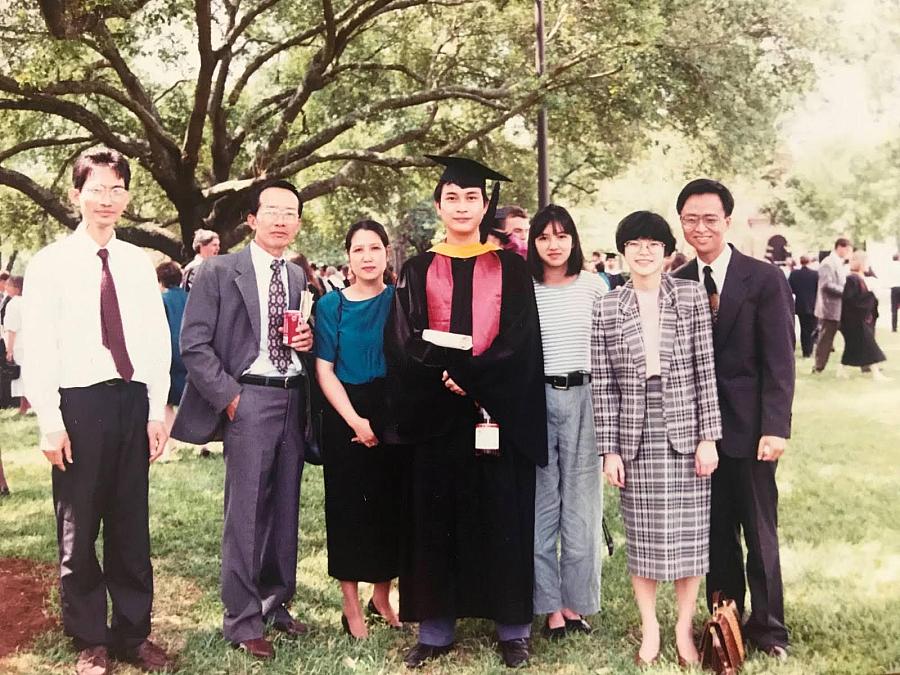Why I wanted to highlight the mental health challenges facing Vietnamese Americans

Dr. Giao Nguyen, at center, at his Rice University graduation, flanked by family. A former refugee turned psychiatrist, Nguyen battled mental illness for years.
(Courtesy photo)
When I received a text message from my editor-in-chief after I submitted the last feature in my series — “Your articles really moved me!” — I knew I was approaching my goal for this reporting project.
He meant the words from the bottom of his heart. He had recently suffered a significant loss in his life, and nothing could alleviate the pain that he and his family are going through. I now know he took seriously one of the quotes in the article: “Be kind to yourself!”
“Be kind to yourself” is in some ways the final coda of my series, supported by the Impact Fund for Reporting on Health Equity and Health Systems.
I found a lot of studies over the past two decades discussing mental illness among Vietnamese Americans. Many of them provided data over the years. But I wanted to do more. I wanted to report in-depth articles on the causes, results and solutions to the ongoing crisis. I sought to listen and tell the story of real lives. I wanted to know how Vietnamese Americans experienced mental health and how they struggled with it.
The stories of Chieu Ha Phan, Tammy Nguyen, and the journey of Giao Nguyen, from a patient to a psychiatrist, touched my heart and inspired me deeply. I observed how generational and cultural gaps can lead to loneliness and cause extraordinary mental health challenges.
Dr. Giao Nguyen, a former refugee turned psychiatrist, battled mental illness for years. Now thriving, he dedicates himself to helping others and cherishing life. His life story inspired me, giving me a broader perspective on the mental health challenges faced by many in the Vietnamese American community. During an interview, he told me, “When parents, who are the first generation, have expectations for their children, it usually means that they will do their best to provide them with an education.”
It's not easy to express a nation’s half-century history in just a few articles, but by listening to the advice of doctors and those who’ve struggled through their own experiences, we can all take inspiration from their stories.
“Loneliness is a significant problem in society nowadays,” said Dr. Nguyen. “Research indicates that many individuals worldwide, particularly in the U.S., currently experience loneliness. This has become an ‘epidemic’ that leads to mental and physical illnesses, and its impact is equivalent to smoking ten cigarettes a day.”
The story of Tammy Nguyen in Arkansas illustrates the cultural gap that causes loneliness in both generations and extraordinary mental health issues.
The family, including Tammy, her brother, sister, and parents, has experienced significant intergenerational trauma. Despite being Vietnamese, Tammy’s parents never had a friendly conversation with her and her siblings since they grew up speaking English. Her parents, Mr. and Mrs. Tam Nguyen have always wanted to spend family time together, but that never happened. They have been factory workers since the first day they arrived in the United States. They worked two jobs. They worked day and night and rarely took days off. In nearly 30 years in the United States, the family seldom had a family trip to spend time together. Working to earn and save money was the essential task for them.
Tammy, once a happy and intelligent girl, now lives with acquaintances, and is disconnected from her parents. Since leaving her parents to start a new chapter, she has never returned and refuses to see them. Meanwhile, her parents continue to work eight hours a day and live in a large, joyless house.
On a personal level, the fellowship has been a journey of self-discovery and introspection. As I accompanied others on their paths to healing, I found myself confronting my biases, fears, and insecurities. Through vulnerability and self-reflection, I have gained a deeper understanding of myself and the factors that shape my perceptions and actions. This journey of self-awareness has been both humbling and empowering, allowing me to cultivate authenticity and compassion in my interactions with others.
I didn’t want to focus my series on the mental health of the previous generation only. It’s been 49 years already since the Vietnam War ended. It is essential to recognize and embrace the pain of the past as we strive to lead a more fulfilling spiritual life in the present and future. Through self-reflection and a commitment to healing, we can transcend our past traumas and emerge more robust and resilient. Engaging in practices such as meditation and connecting with a supportive community can cultivate a sense of purpose and inner peace to guide us on our spiritual journey.
When life becomes overwhelming, with pressures all around, how do we alleviate them? “The answer is simple: reducing our desires,” psychiatrist Giao Nguyen said.
“Why pursue a second car and take on multiple jobs when the one you have is already sufficient? A comfortable home meets your needs, so there’s no need to strive for more space or luxury,” he said. “It’s important to relieve some of the pressure in your life, both for yourself and those around you.”
It brings to mind the heartwrenching story of Tammy Nguyen’s family. I wish Tammy’s parents could have heard Dr. Nguyen's words and made a different choice for their own family, to have another life, without so much pressure, without the constant need for more money.
The world is increasingly designed to depress us. If we were happy with what we had, why would we need more? “Be kind to yourself,” said psychologist Suzie Dong.

